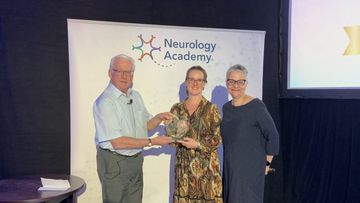Parkinson’s admission & outcome study: Ysbyty Ystrad Fawr Hospital
This audit captured data from 50 PD patients in total with a hospital admission over a period of six months. These patients were randomly selected from the admission list.
Demographics:
- Age range: 64 years to 82 years.
- Sex ratio Male:female 25:25
- Length of stay ranges from 6 days to 73 days.
- 38 % of admitted patients were not reviewed by the movement disorder team.
The majority of patients (92%) were living at home when they were admitted. Two-thirds were discharged back home, and a fifth to a nursing home. The majority (60%) were in the complex phase of PD, with 30% in the maintenance phase (8% advanced phase, 2% diagnosis). In terms of medication, 60% were on levodopa, 24% on a combination, 6% on dopamine agonist, and 2% not on medication. Timing of medication varied, from most patients either on medicaiton four times a day (36%) or three times as day (26%), with smaller numbers taking medication more or less frequently (between one and seven times a day). During their admission, most patients (62%) were seen by the PD team.
Conclusion:
- Review of the PD patients on admission could help with reduction in the length of stay in the ward.
- Intervention from PD team could have benefited in reducing the length of stay and reducing complications.
- Could help early discharge and if needed can be closely monitored in the community by the Parkinson’s disease specialist nurses.
- Could benefit to the trust financially by reducing the length of stay in the hospital.
- Getting the problems sorted early and aiming the patient to go back to their own homes or previous place of stay can reduce the huge financial burden of caring for patients in care homes.
- By reducing the length of stay in hospital, could reduce the risk of hospital acquired infection and other complications in vulnerable patients.
- Need re-auditing to complete the cycle at a later date.
Recommendations:
- All PD admissions to be reviewed by the movement disorder team.
- Generate an alert in the clinical work station on admission to alert the admitting team to say that this patient is known case of PD and please inform the PD team regarding the admission.
- Introduced the above proposal and all the PD patients are now identified and alerted in the clinical work station on admission.
- Aiming to get the involvement of multidisciplinary team such as speech and language therapy, physiotherapist, occupational therapist, dietitian, psychiatric liaison team, social worker/ service, hospital case managers (if Continuing Health Care needs addressing).
We have implemented the following in the hospital and these are being reviewed:
- Identification of PD patients with the Lilly stickers to the to the doors or bedside and case notes.
- Introduction of get it on time stickers to the drug charts to alert the nursing staff to give the medication on time.
- Introduction of Clock sticker to the rooms to alert the patient and staff about the get it on time (Medication)
- Dose -Conversion table for dosage adjustments of different PD medication including patches.
More Parkinson's Academy Inpatient care Projects

'The things you can't get from the books'
Parkinson's Academy, our original and longest running Academy, houses 23 years of inspirational projects, resources, and evidence for improving outcomes for people with Parkinson's. The Academy has a truly collegiate feel and prides itself on delivering 'the things you can't get from books' - a practical learning model which inspires all Neurology Academy courses.